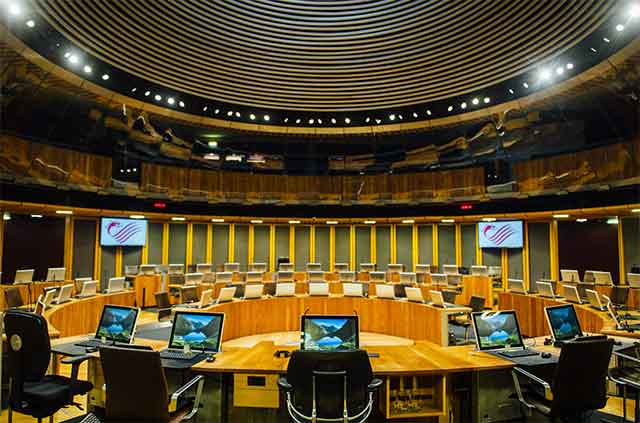The Senedd narrowly rejected calls for all new power lines to be placed underground.
Adam Price led a debate on a Plaid Cymru motion to make it mandatory for all new electricity distribution lines to be underground rather than overhead pylons.
He explained that current Welsh Government policy says new power lines should be laid underground but it includes a caveat on cost grounds.
Mr Price warned the policy is not working as intended, saying: “As long as the caveat exists, developers will always exploit it and build pylons as their preferred option.”
He said this has been a catalyst for a “rash of proposals for long-range pylon lines traversing large swathes of our country”, including in his Carmarthen East and Dinefwr constituency.
‘Mass pylonisation’
Mr Price urged the Welsh Government to mandate underground power lines, following the example of other European countries.
He said Denmark has reaped the benefits of a more rapid path to decarbonisation, with public opposition to renewables much more muted as a result of undergrounding.
The former Plaid Cymru leader said underground cables do not spoil the landscape, are cheaper to maintain and more reliable, with reduced outages improving grid resilience.
He added that they are less susceptible to storms and high winds – “a phenomenon that will become more important in future as climate change-induced extreme weather increases”.
Mr Price welcomed a review but said: “If we want to prevent the kind of mass pylonisation that much of our country is currently facing, then we can’t afford to wait for the outcome.”
‘Circumvention’
Mark Isherwood, for the Conservatives, told the chamber his party would support the motion, agreeing that the wording in Planning Policy Wales needs to be toughened up.
The North Wales MS said Welsh ministers need to be stronger in following guidance rather than allowing arguments of cost to justify “circumvention” of planning policies.
He stressed that the health impact of undergrounding near homes must be considered.
Russell George, the Tory MS for Montgomeryshire, raised concerns about overproliferation of windfarms and power lines “thundering” through the hills of Mid Wales.
Siân Gwenllian, the Plaid Cymru MS for Arfon, warned the caveat allows costs to take precedence over environmental, social and aesthetic factors.
She said: “By removing the cost-based caveat, we can prioritise the long-term benefits of underground power lines, we can protect our landscapes, and, vitally, we can gain the public support needed to achieve our climate goals.”
‘Problematic’
Julie James, who is responsible for planning, said the Welsh Government and opposition are not miles apart but she took issue with the “problematic” wording of the motion.
The local government secretary said: “The only real difference in this motion today is that we differ on whether it’s appropriate to mandate all cables to be underground where possible.”
Ms James told the chamber the words “where possible” are important “because it is physically possible to do it in places where I think we’d all agree we don’t want”.
The former lawyer acknowledged that the Welsh Government needs to “tighten up what we mean by ‘unaffordable’ in a very big way”.
Ms James said Jeremy Miles, who is responsible for energy, has set up an independent advisory group and Planning Policy Wales will be updated to reflect its review.
‘Altar of profit’
Cefin Campbell, who represents Mid and West Wales, warned Wales’ beautiful landscape is being “sacrificed on the altar of profit”.
“We must underground these cables,” he said. “In doing so, we as a Senedd will be taking a strong stance to protect the natural beauty and the ecology of our unique landscapes.”
He told the meeting on June 12 that the extra upfront cost of undergrounding cables is a small price to pay for preservation of the landscape.
With the vote tied 25-25, David Rees – the Senedd’s deputy speaker or Dirprwy Lywydd – broke the deadlock by using his casting vote against the motion.
Under the Senedd’s rules, the chair was required to vote to maintain the status quo.
Plaid Cymru, the Conservatives and Jane Dodds, the Lib Dems’ leader in Wales, backed the motion, while Labour backbenchers and ministers voted against.

